|
Progressive Men of
Iowa
1899
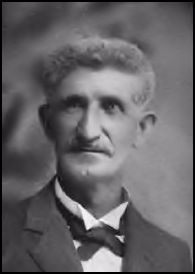 EVANS, James McFarland, of Salem, is one of
the best-known physicians of southeastern Iowa. His
ancestors were mostly Scotch and Irish. His father, Abel
M. Evans, was the son of Joseph Evans, of Welsh descent,
and Sarah McFarland, daughter of Judge William
McFarland, whose father, Daniel McFarland, came from
Scotland to America about 1750, settling for a time in
New England, and then permanently in Washington county,
Pa., where he had much to do with the development of the
country. During the revolutionary war he held a
commission in the army. He died in 1817, aged 87,
leaving a valuable estate, which is still in the
possession of his descendant, Abel Evans, the doctor's
father, who was born in 1819. He was married March 15,
1888, to Elizabeth Weir, who was born in 1821, and whose
father, Adam Weir, was the son of William Weir, who came
to this country from Scotland in 1750 and settled in
Franklin county, Pa. The Weir family, which belonged to
the parish of " Lesmahagow " in Scotland, was at one
time very prominent in that country, it being recorded
that, in 1695, two members of the family, James and John
Weir, owned a castle and grounds, known as "Glenare, "
which remained standing until 1857. Others of the family
were clergymen, soldiers, and members of parliament.
They were quite conspicuous during the war of the
covenant in Scotland, which raged during the sixteenth
century, bravely contending for liberty of worship. EVANS, James McFarland, of Salem, is one of
the best-known physicians of southeastern Iowa. His
ancestors were mostly Scotch and Irish. His father, Abel
M. Evans, was the son of Joseph Evans, of Welsh descent,
and Sarah McFarland, daughter of Judge William
McFarland, whose father, Daniel McFarland, came from
Scotland to America about 1750, settling for a time in
New England, and then permanently in Washington county,
Pa., where he had much to do with the development of the
country. During the revolutionary war he held a
commission in the army. He died in 1817, aged 87,
leaving a valuable estate, which is still in the
possession of his descendant, Abel Evans, the doctor's
father, who was born in 1819. He was married March 15,
1888, to Elizabeth Weir, who was born in 1821, and whose
father, Adam Weir, was the son of William Weir, who came
to this country from Scotland in 1750 and settled in
Franklin county, Pa. The Weir family, which belonged to
the parish of " Lesmahagow " in Scotland, was at one
time very prominent in that country, it being recorded
that, in 1695, two members of the family, James and John
Weir, owned a castle and grounds, known as "Glenare, "
which remained standing until 1857. Others of the family
were clergymen, soldiers, and members of parliament.
They were quite conspicuous during the war of the
covenant in Scotland, which raged during the sixteenth
century, bravely contending for liberty of worship.
Dr. J. M. Evans was born
September 19, 1841, in Washington county, Pa., and was
the younger of two sons, his brother Samuel dying June
30, 1864, from the effects of wounds received in the
battle of Cold Harbor, Va. Dr. Evans' mother died when
he was but 2 weeks old, and he was brought up by other
relatives. His early education was obtained in the
common schools of Pennsylvania, which were well up to
the average of that day. At 16 he entered Waynesburg
college, in Greene county, Pa., but at the end of three
years left school without completing the course, in
order to enlist in the army. He joined the Eighth
regiment of Pennsylvania Reserves, Volunteer infantry,
as a private in Company K, May 1, 1861. In the second
battle of Bull Run he received a severe wound in the
left shoulder and was discharged from service on account
of this disability February 13, 1863, at Baltimore, Md.
He came to Iowa May 28, 1865, and began the study of
medicine with Dr. L. E. Goodell, a
broad-minded man and one of the most successful
physicians of the state. After a year and
a half spent in study under this man's direction, Dr.
Evans attended lectures at the Western Medical college
in Cleveland, Ohio. He began the practice of medicine at
Pilot Grove, Lee county, Iowa, in 1868, removing October
15, 1872, to West Point, in the same county, and on
March 2, 1880, he located at Salem, Henry county, his
present home. Thus he has practiced for about thirty
years over the same field, all these removals having
been within a radius of twenty miles. Though he has
amassed a comfortable fortune, and owns one of the best
medical libraries in the state, the doctor still
continues to practice, preferring a life of activity to
one of retirement.
Dr. Evans is a member of Salem Lodge No. 17, A.
F. & A. M, and is also a member of the G. A. R. In
politics he is a republican, and in religion he adheres
to the faith of his ancestors, and is a
Presbyterian.
The doctor was married December 3,
1868, to Miss Helene Lusk. Their family now includes
three daughters: Victorine, born in 1869, now Mrs. C. H.
Cook, of Omaha; Winona, born in 1871, and Helen
McFarland, born in 1873. His wife died at Salem, Iowa,
May 2, 1897. Winona was married in 1897; is now Mrs.
Harry Reeves, and lives at
Keokuk.
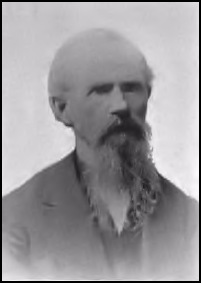 MARSH, Charles Franklin, of Mt. Pleasant, is
among the best known physicians and army surgeons of
southeastern Iowa. He is a son of the late Dr. William
Stockman Marsh, who was born January 23, 1817, on
Nantucket Island, Mass., and died at Mt. Pleasant, March
1, 1896. He had followed his profession all his life,
and he prescribed for patients within a few days of his
death. The eldest son of a poorly paid itinerant
minister, he had to help support the family, and hence
his early educational advantages were quite limited. But
with a determined purpose he spent his evenings in
study, thus mastering the rudiments of the art. He
afterwards studied with his brother-in-law, Dr. Freeman Knowles,
later one of the professors of the medical department of
the State university. He also attended lectures at the
old McDowell college in St. Louis, and in 1854 graduated
in medicine at Keokuk. He was married
February 9, 1841, to Abigail Simpson Knowles, daughter
of Capt.
Amasa Knowles, at Hampden, Me. The Knowles family
were early settlers at Plymouth, Mass., and trace their
ancestors back to the days of Queen Elizabeth.
Immediately after his marriage Dr. Marsh started west
with his wife, stopping first at Macomb, 111., and in
1842 located at Lowell, Henry county, Iowa, removing in
1845 to West Point, Lee county, and in 1855 to Mt. Pleasant, where
he remained until his death, in 1896. Mrs. Marsh died in
1892. Dr.
William Marsh was commissioned surgeon of the
Twenty-fifth Iowa infantry, September 16, 1862, but was
forced by broken health to resign February 7, 1863. While serving at
Young's Point, La., he became so prostrated that he was
obliged to crawl on his hands and knees while attending
the sick and wounded. MARSH, Charles Franklin, of Mt. Pleasant, is
among the best known physicians and army surgeons of
southeastern Iowa. He is a son of the late Dr. William
Stockman Marsh, who was born January 23, 1817, on
Nantucket Island, Mass., and died at Mt. Pleasant, March
1, 1896. He had followed his profession all his life,
and he prescribed for patients within a few days of his
death. The eldest son of a poorly paid itinerant
minister, he had to help support the family, and hence
his early educational advantages were quite limited. But
with a determined purpose he spent his evenings in
study, thus mastering the rudiments of the art. He
afterwards studied with his brother-in-law, Dr. Freeman Knowles,
later one of the professors of the medical department of
the State university. He also attended lectures at the
old McDowell college in St. Louis, and in 1854 graduated
in medicine at Keokuk. He was married
February 9, 1841, to Abigail Simpson Knowles, daughter
of Capt.
Amasa Knowles, at Hampden, Me. The Knowles family
were early settlers at Plymouth, Mass., and trace their
ancestors back to the days of Queen Elizabeth.
Immediately after his marriage Dr. Marsh started west
with his wife, stopping first at Macomb, 111., and in
1842 located at Lowell, Henry county, Iowa, removing in
1845 to West Point, Lee county, and in 1855 to Mt. Pleasant, where
he remained until his death, in 1896. Mrs. Marsh died in
1892. Dr.
William Marsh was commissioned surgeon of the
Twenty-fifth Iowa infantry, September 16, 1862, but was
forced by broken health to resign February 7, 1863. While serving at
Young's Point, La., he became so prostrated that he was
obliged to crawl on his hands and knees while attending
the sick and wounded.
Dr. C. F. Marsh was born
January 6, 1842, at Macomb, 111., and was the oldest of
five children. He comes from a long line of New England
ancestors. His great-grandfather, John Marsh, was a
government agent to the Penobscot Indians, and his
grandfather, William Marsh, was connected with the East
Maine Methodist conference for over forty years. His
grandmother, Susan Spooner Stockman, was born May 22,
1793. She was married to William Marsh, May 21, 1815,
and died May 26, 1861. Her parents were Jacob and Susan
(Spooner) Stockman. Her grandfather, Charles Spooner,
was the son of Wing Spooner, who served as a captain of
the militia during the revolution. This family descended
from William Spooner, who came to the Plymouth
settlement early in 1637 from Leyden, Holland, but
originally from England.
Dr. Marsh began his education
in the private school of P. P. Root, at West Point,
Iowa, and in 1860 graduated from the Iowa Wesleyan
university with the degree of B. S. He immediately began
the study of medicine in the State university, the
medical department being then located at Keokuk. He was
made assistant physician of Estes House hospital, at
Keokuk, Iowa, just after the battle of Pittsburg
Landing, in 1862, when but 20 years old, and was
appointed hospital steward of the Twenty-fifth Iowa
infantry in September, 1862. The following February he
was promoted to the position of assistant surgeon of the
regiment. He served as a surgeon during the entire
remainder of the war, helping to establish a general
hospital at Vicksburg, in conjunction with Surgeon
Alexander Shaw, of the Fourth Iowa, under orders of
General Grant; also at Rome, Ga., with Surgeon G. F.
French, superintendent of hospitals for the army of the
Tennessee, and again at Atlanta. He was appointed
surgeon of the Twenty-fifth Iowa, November 15, 1864, and
was the youngest officer with the rank of full surgeon
in Sherman's army.
He was with the army at Young's Point, La.,
Vicksburg and Chattanooga; at the battles of Lookout
Mountain, Mission Ridge and Ringgold, at Woodville and
Huntsville, Ala., Rome, Ga., Atlanta and Savannah, and
accompanied his regiment on the famous march to the sea,
and went with the army to
Washington.
The doctor has followed his
profession with gratifying success since the close of
the war, making Mt. Pleasant his home most of the time.
He graduated in 1869 from the medical department of the
Michigan university, at Ann Arbor. He is a member of the
Iowa State Medical society, the Des Moines Valley
Medical association, and that of Pensacola, Fla. He was
a delegate to the National Medical association in 1893,
and a member of the board of surgeons for examination of
pensioners at Mt. Pleasant, in 1874-5-6, and at various
times since, including President Harrison's
administration. He was for years a member of the board
of insane commissioners for Henry county, and physical
examiner for various life insurance
companies.
Dr. Marsh has always been a
republican, casting his first vote for Abraham Lincoln,
in 1864. He is a member of the G. A. R., and the K. A.
E. O., and a member of the Methodist Episcopal church.
He was married May 12, 1870, to Mrs. Louise Mather
Crawford, at Chicago. They have three children: Frank
C., born March 16, 1871; Frederick William, September
10, 1873, and Laura Helen, December 4,
1875.
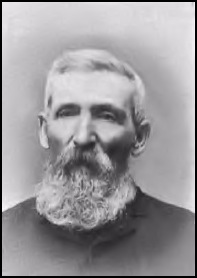 TYNER George W., late of Salem, was one of
the early settlers of Henry county, and a successful
farmer and business man, holding the responsible
position at the time of his death, in 1896, of president
of the Bank of Salem. He was a native of Indiana, where
his parents were among the early pioneers. His father,
Elijah Tyner, was born March 21, 1799, on Little river,
Abbeyville district, S. C., and was the second son of
Rev. William Tyner, a Baptist minister, who removed with
his family to Kentucky in 1803, and three years later to
the territory of Indiana, locating near where Brookville
has since been built He removed later to Decatur county,
where he died. Elijah Tyner took a claim in Hancock
county, Ind., at a time when the only roads were Indian
trails, although he was not more than fifteen or twenty
miles from Indianapolis. Here he kept a small stock of
merchandise in a log cabin, and was a merchant all his
life, a large part of which was spent on his original
claim. At the time of his death, he was a man of wealth,
owning over 1,000 acres of land in central Indiana, all
in one piece.
He was married three times, and George W. was the
oldest of the third wife's seven
children. TYNER George W., late of Salem, was one of
the early settlers of Henry county, and a successful
farmer and business man, holding the responsible
position at the time of his death, in 1896, of president
of the Bank of Salem. He was a native of Indiana, where
his parents were among the early pioneers. His father,
Elijah Tyner, was born March 21, 1799, on Little river,
Abbeyville district, S. C., and was the second son of
Rev. William Tyner, a Baptist minister, who removed with
his family to Kentucky in 1803, and three years later to
the territory of Indiana, locating near where Brookville
has since been built He removed later to Decatur county,
where he died. Elijah Tyner took a claim in Hancock
county, Ind., at a time when the only roads were Indian
trails, although he was not more than fifteen or twenty
miles from Indianapolis. Here he kept a small stock of
merchandise in a log cabin, and was a merchant all his
life, a large part of which was spent on his original
claim. At the time of his death, he was a man of wealth,
owning over 1,000 acres of land in central Indiana, all
in one piece.
He was married three times, and George W. was the
oldest of the third wife's seven
children.
G. W. Tyner was born December
3, 1832, in Hancock county, Ind., near Morristown. Here he grew to
manhood, and at the age of 22 came to McDonough county,
III., where he commenced farming and stock raising. The
next year he removed to Iowa, and was married October
17, 1855, to Mary Frances Bartlett, with whom he had
become acquainted in Illinois. They settled immediately
upon the farm in Henry county, which was their home for
nearly forty years. After the death of his wife, in
1892, Mr. Tyner no longer cared to remain on the farm,
and therefore moved to town and made his home with his
sons in Salem. Eight children were born to Mr. and Mrs. Tyner:
William and John, who died in childhood; Elijah, who
resides on the old homestead; Sarah C., wife of Dr. A. J. Rogers, of
Hillsboro, Iowa; Melvin, a lawyer, at Pasadena, Cal.;
Oliver, assistant cashier of the Bank of Salem; James, a
clothier of that city; and Elbert, a farmer living near
there.
Politically, Mr. Tyner was a
republican, but was never an office seeker, having held
only local offices. His interests were rather in his
home and business than in quest of public honors. For a
number of years he was treasurer of the Hillsboro and
Salem District Fair association, which owed much of its
success to his tireless efforts. During the winter of
1895, a few months before his death, he united with the
Congregational church of Salem. Mr. Tyner's
death occurred August 19, 1896, after a tedious illness
which he had endured with great patience. At the time of
his death it was said of him: "He was a man whom we all
loved and admired. In his dealings with his fellow men
he was honest, and strived to keep the golden rule; as a
neighbor, none could excel him; as a business man, he
was a skillful manager, shrewd investor and a splendid
financier. As a citizen, he was modest and retiring,
leading a life of the utmost simplicity, abhorring
anything affected. His greatest pleasures in life were
to do acts of kindness for his
family."
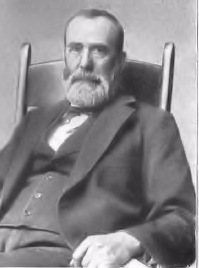 VAN ALLEN, George C., a prominent
business
man of Mt. Pleasant,
Henry county, was born July 6, 1830, on the north shore
of Pillar Point, Jefferson county, N. Y., and was the
oldest child of Cornelius Van Allen and Lory Ann
Ackerman, his wife. VAN ALLEN, George C., a prominent
business
man of Mt. Pleasant,
Henry county, was born July 6, 1830, on the north shore
of Pillar Point, Jefferson county, N. Y., and was the
oldest child of Cornelius Van Allen and Lory Ann
Ackerman, his wife.
The family consisted of
eleven children, nine of whom are still living. Besides
the subject of this sketch they are: Martin, a Chicago
real estate man living in Ravenswood: Sarah H. White, of
Carthage, N Y., widow of Gen. D. B. White; Lory Ann
Hoover, of Chicago, 111., widow of George Hoover;
Catherine Grinnell, of May Fair, Cook county, 111.,
widow of G. G. Grinnell; Mrs. C. M. Beckford, of
Hampton, Va., widow of Selwyn E. Beckford; Cornelius A.,
real estate, of Effingham, 111 ; William, surveyor, of
Ukiah, Cal., and Florence O. Baulch, wife of J. J.
Baulch, of St. Louis, Mo. In 1831 the family moved to a
farm of their own near by, over looking Black River bay.
Across the bay could easily be seen Madison barracks,
where General Grant was once quartered, and the village
of Sackett's Harbor, famous in one of the early battles
of the war of 1812, in May, 1813.
Upon this farm the boy grew
to manhood, attending the country schools, working at
the forge and in the ship yards, and at times engaged in
hauling heavy timbers out of the forest into the
shipyards. Living so many years near the water he grew
to love it, for it afforded him pleasure as a boy and
helped to earn his living as a man, in the early days
before railways took the place of boats. In this
vicinity Mr. Van Allen taught in the public schools, and
later attended Falley seminary in Fulton, N. Y. From
there he went to the Old Wesleyan university in
Middletown, Conn., where he was a member of a secret
society organized by a few congenial fellows, including
William and Andrew Roe. O. W. Powers, Mr. Bailey, and
David J. Brewer. The latter, then one of the most modest
of young men, is now a judge of the supreme court of the
United States. Mr.
Van Allen remained there a little less than two
years, when he was obliged to return home, carrying with
him gentle memories of the kindness of student friends,
especially Brooks. Fellows, and Bishop. He had good
standing in his classes in school, but the teachers did
not deeply influence him, for he was a close student and
reached his own conclusions, taking but little on the
authority of teachers
alone.
After some weeks recuperation
at home at Pillar Point, he took what little money he
had and started west by way of the great lakes. The trip
was a delightful one, and gave him broader ideas of the
size of the world than he had ever obtained from books.
Detroit and Milwaukee were beautiful cities at that
time, but Chicago was a dirty little village, although
full of hustling men, broken sidewalks, and muddy
streets, with a disordered levee and railway yards. Mr.
Van Allen went to Dubuque, expecting to secure
employment at surveying, but finding nothing in this
line, an old friend, George Rogers, secured him a place
in the business office of the Dubuque Herald as
bookkeeper. The Herald was then published by J. B. Dorr,
afterward colonel of the Eighth Iowa cavalry. In the
spring the young surveyor secured a place with Webb and
Higby, surveyors, and afterward with Charles Smith,
local engineer of the Dubuque & Pacific railway. In
July his brother Martin secured for him a still better
position in the land department of the Illinois Central
railroad. At first he traveled for the company in
Wisconsin, Minnesota and Iowa. January 1, 1857, he was
promoted and sent to Effingham, 200 miles south of
Chicago, on the Illinois Central, to sell the company's
lands. His sales by the first of October amounted to
13,000 acres. One could hardly see a dozen houses in an
hour's ride on the cars, except a few at the scattered
stations.
During this season of
prosperity Mr. Van Allen was married, August 6, 1857, in
Scriba, N. Y. to Miss Jennie M. Wright, who had been a
classmate in Fulton. She was a cultured lady of domestic
tastes, and Mr. Van Allen always regarded the event of
their marriage as the beginning of a very happy part of
his life.
In October, 1857, the great financial crash came,
destroying or badly crippling all the business of the
country. Land sales stopped, payments failed,
enterprising people who had started out to make new
homes fell back to their old domiciles to begin life
anew or die of disappointment. Mr. Van Allen lost about
$6,000 in this panic and had to begin over again,
falling back on his knowledge of surveying to support
his family. In his spare moments he read law, and in the
fall of 1859 went to Watertown, N. Y., and spent two
years in the office of Judge F. W. Hubbard, then lately
from the bench of the New York court of appeals. During
the following two years he studied part of the time in
the Albany Law school, and at the April, 1861, term of
the supreme court he was admitted to the degree of
counsellor at law in the state of New York. He soon
after returned to Chicago and then to Kenosha, but the
war was on and there was no business for him, so he
spent a few months in the office of Judge Pettitt. He
was elected to the superintendence of the high school in
Plover, Wis., that fall, remaining till July, 1862, when
he went to Burlington, and engaged in the survey of the
Burlington & Missouri River railroad from Ottumwa to
Chariton. At the close of the season he located in Mt.
Pleasant, where he engaged in compiling records for the
examination of titles. Here he has ever since remained,
closely confined to one of the most laborious, and by no
means least important, branches of the law. He suffered
another backset in 1883, when his office was destroyed
by fire, at a loss of $2,000. But he soon recovered from
the shock and began to re-write his
books.
His wife died January 27,
1891, and he was again married, October 26, 1893, to
Miss Anna L. Watters. One son, Alfred M. Van Allen, was
born October 3, 1869. He was educated
in the Iowa Wesleyan university, graduated from the
state university law school in June, 1894, and is now
engaged in the successful practice of his profession in
Mt. Pleasant.
Mr. Van Allen had always been
a republican, and a quiet but efficient worker for
others when offices were to be filled, but never seeking
any office for himself. He was brought up a Methodist,
but on removing to Mt. Pleasant united with the
Presbyterian church, to which his wife belonged. He is a man who thinks for himself, decides for
himself, and acts for himself, and is one of the most
public spirited and highly respected men in his
community.
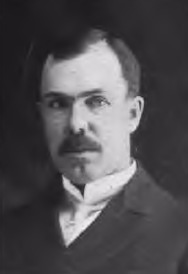 WITHROW, Winfield Scott, one of the judges of
the Twentieth district, composed of the counties of Des
Moines, Henry and Louisa, and living at Mt. Pleasant, is
one of the best known and most prominent men of
southeastern Iowa. He is a native of the state, having
been born at Salem, Henry county, September 28, 1855.
His father was the Hon. A. J. Withrow, who was a member
of the Iowa general assembly in 1860. At the expiration
of his term he joined the Twenty-fifth Iowa infantry as
first lieutenant of Company C. He resigned in 1864,
having contracted a disease from the effects of which he
died June 6, 1867. His mother, Libertatia A. Arnold, was
a native of Ohio, coming to Iowa in 1854. She died
September 24, 1896. WITHROW, Winfield Scott, one of the judges of
the Twentieth district, composed of the counties of Des
Moines, Henry and Louisa, and living at Mt. Pleasant, is
one of the best known and most prominent men of
southeastern Iowa. He is a native of the state, having
been born at Salem, Henry county, September 28, 1855.
His father was the Hon. A. J. Withrow, who was a member
of the Iowa general assembly in 1860. At the expiration
of his term he joined the Twenty-fifth Iowa infantry as
first lieutenant of Company C. He resigned in 1864,
having contracted a disease from the effects of which he
died June 6, 1867. His mother, Libertatia A. Arnold, was
a native of Ohio, coming to Iowa in 1854. She died
September 24, 1896.
Judge Withrow obtained his
early education in the public schools of Henry county,
and in Whittier college, a Quaker institution in Salem.
Being thrown upon his own resources at an early age by
the death of his father, he learned the printer's trade,
working at the case for several years, and attending
school while not thus engaged. He then spent
some time in teaching school until he had secured the
means with which to take a law course at the State
university, graduating from the law department of that
institution in 1880. After being admitted to the bar, he
returned to Salem and commenced the practice of law,
joining with it the management of the Salem Weekly News.
At this time he was elected mayor of Salem, and was
re-elected for two additional terms. In 1885 he was
nominated by the republicans of Henry county for the
legislature and was elected. The nomination came to him
unasked. He declined a re-nomination, choosing rather to
give his whole time to his profession. In 1887 he
removed to Mt. Pleasant, forming a law partnership with
Judge W. J. Jeffries, which continued up to the death of
the latter. In 1894 he associated himself in practice
with W. F. Kopp under the firm name of Withrow &
Kopp. January 1, 1895, Judge W. I. Babb connected
himself with the firm, the partnership then becom-ing
Babb, Withrow & Kopp. Mr. Kopp retired the same year
and the firm of Babb & Withrow continued until the
appointment of Mr. Withrow as judge. This appointment
was made by Governor Drake, after the Twentieth judicial
district was created by the general assembly, and after
Mr. Withrow had been nominated by the republicans of the
district as their candidate for judge. His work upon the
bench after his appointment was endorsed by the voters
of his district, in his election by a large majority for
the full term of four years. Judge Withrow's business
and professional career, both in Salem and Mt. Pleasant has
been very successful and during his practice he was
connected with practically all of the important
litigation in Henry county. He is a staunch republican
and was a delegate in the national convention in 1892,
from the First congressional district. He is a trustee
of the Iowa Wesleyan university, and a member of the
executive committee of the board, and was for four years
president of the board of education in Mt.
Pleasant.
He was married June 17, 1885, to
Anna A. Webb, daughter of Rev. W. W. Webb, of Mankato,
Minn. They have had four children: Webb and Arthur,
deceased, and Dorothy and Miriam, now
living.
The information
on Trails to the Past © Copyright may be used in personal family history research, with source citation. The pages in entirety may not be duplicated for publication in any fashion without the permission of the owner. Commercial use of any material on this site is not permitted. Please respect the wishes of those who have contributed their time and efforts to make this free site possible.~Thank you! |